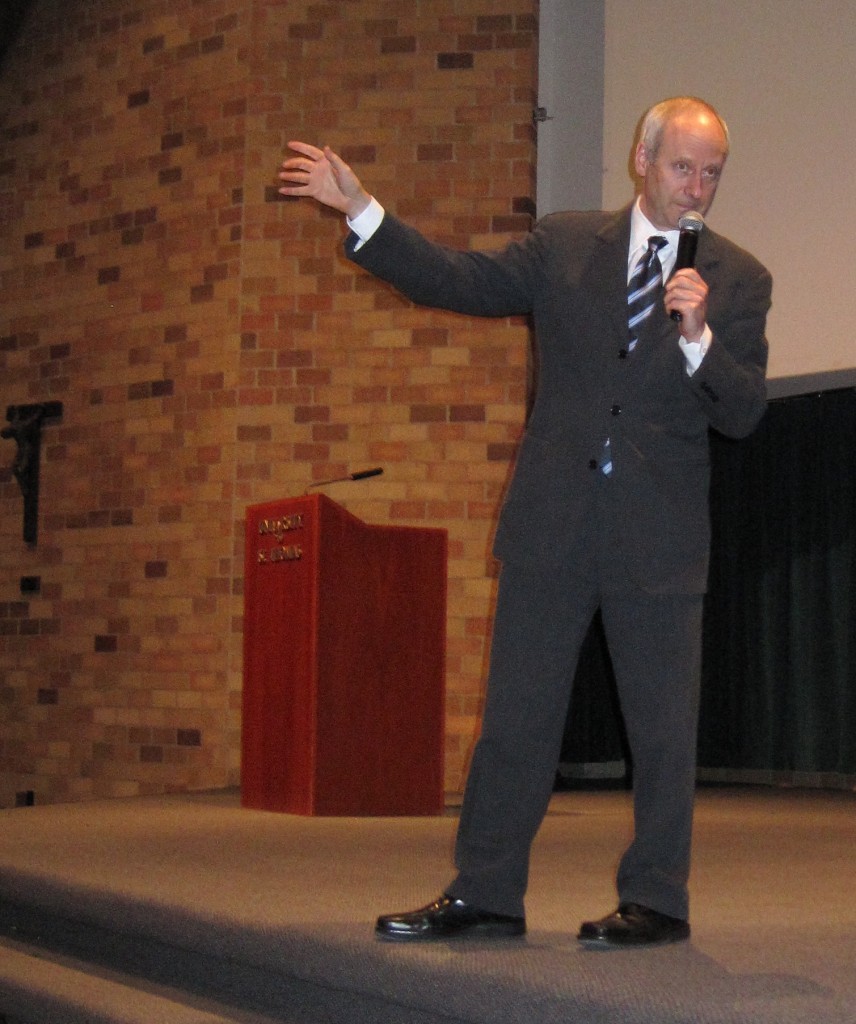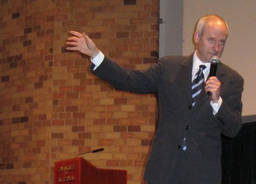Harvard professor Michael Sandel started his speech on civil discourse Tuesday night by telling audience members to imagine they were driving a trolley with broken brakes careening toward people on the tracks.
He had audience members vote on whether they would keep the trolley on track and kill five workers, or if they would divert the trolley to a side track and kill one worker. He used the interactive discussion to question audience members about their choices and highlight the importance of moral engagement.
During his speech, which was part of the second annual Public Discourse Lecture Series sponsored by the College of Arts and Sciences, Sandel emphasized that people must discuss moral and spiritual values’ underlying issues if they want to increase civil discourse.

“I think the greatest protection [against disrespect] is to engage more directly and explicitly with the competing goods that our different moral and even spiritual traditions reflect,” Sandel said. “And even if it doesn’t lead to more agreement, I think it will lead to a more civil kind of politics and above all, to a more truly democratic citizenship.”
Sandel, deemed “perhaps the most prominent college professor in America” by the Washington Post, teaches a course called “Justice” at Harvard, which has enrolled more than 15,000 students and is also available online. During his speech in the O’Shaughnessy Educational Center auditorium, Sandel had audience members imagine themselves in various hypothetical situations and had them defend their choices in life-or-death situations.
“I really liked how Sandel conveyed his point by engaging the audience in an interactive discussion,” said sophomore Kesha Berg. “By demonstrating that tough issues, like the examples he presented, really do come down to virtues and discussing those virtues is really important. It really gets down to the meat of the argument being made.”
Sophomore Katie Zillmer said she enjoyed the speech as well.
“I think Michael Sandel is one of the greatest intellectuals in America right now,” Zillmer said. “He challenges students to truly analyze what their values are and to develop an argument behind them that actually makes sense rather than just going on what they have heard. He really promotes democracy in the way he lectures and what he lectures about.”
But some audience members disagreed with this discussion method.
“I think that the way he led this was a very long way to get there and a bit frustrating, too, because he uses these different random examples,” audience member Andrea Brownlow said. “A majority of the people had an opinion, but they did not really want to get involved in the discussion. Then the few people who did get involved did not really listen to the other people talking or his questions.
“He did not provide any guidance. He just played the devil’s advocate, trying to undermine everyone’s opinions.”
Sandel tied the hypothetical moral questions back to the topic of civil discourse by explaining that to have an informed discussion, people must analyze the moral reasoning behind the arguments of others.
“A politics of moral engagement would lead to a more civil politics rather than more strife,” Sandel said. “Not because it would lead us to more agreement, but instead because it would develop a different set of moral habits.”
He also said higher education must do a better job of “cultivating citizens” who are not only informed but also care about the common good.
Brownlow said she agreed with Sandel that everyone needs to examine the issues behind other people’s opinions and beliefs.
“It’s only when you do that will you have a proper, intelligent conversation and actually get somewhere,” she said.
Maggie Clemensen can be reached at clem0427@stthomas.edu.

